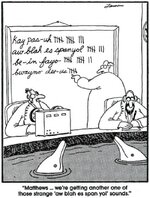Jarhyn
Wizard
- Joined
- Mar 29, 2010
- Messages
- 14,698
- Gender
- Androgyne; they/them
- Basic Beliefs
- Natural Philosophy, Game Theoretic Ethicist
So a thread was started in Moral Principles about the ethical implications of an animal that speaks, particularly of a variety which we as humans eat.
Such examples of animals which speak include both a wide array of gorillas who have command of sign language, as well as a growing number of house pets which have been given access to sound boards, among the number of which includes a poodle/shepherd mix with a stunning amount of vocabulary and the apparent capability of mixing words to create adverbs.
Now, it seems to me to be a No-True-Scotsman to claim that any effective use of tokens to proxy for ideas is not actually language, or to claim that animals can't do it, seeing as we ARE animals who do it. But here's a place to bicker and fight over whether animals can learn to talk.
Such examples of animals which speak include both a wide array of gorillas who have command of sign language, as well as a growing number of house pets which have been given access to sound boards, among the number of which includes a poodle/shepherd mix with a stunning amount of vocabulary and the apparent capability of mixing words to create adverbs.
Now, it seems to me to be a No-True-Scotsman to claim that any effective use of tokens to proxy for ideas is not actually language, or to claim that animals can't do it, seeing as we ARE animals who do it. But here's a place to bicker and fight over whether animals can learn to talk.

